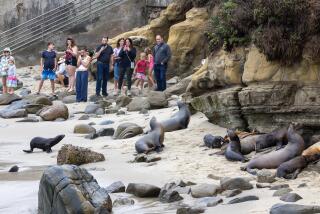Beach deal is tough to seal
- Share via
SAN DIEGO -- Oblivious to the 15-year legal and political fight their presence has caused, harbor seals loll in the water off the Children’s Pool in La Jolla.
They come ashore to sun themselves, bark their distinctive barks and, during pupping season, give birth to adorable little bundles on the beach.
But they also poop, on the sand and in the water, extensively. And that is the focus of the war between seal-lovers and people-firsters over a sheltered cove that is the legacy of one of San Diego’s revered philanthropists.
The City Council, stuck in the middle after years of not satisfying either side, tried in 2004 to fashion a “joint use” plan in which seals and people could coexist on the tiny beach.
The beach would be dredged to increase tidal flushing and take away the excrement. Barriers would keep people away from the seals during pupping season. The beach would be smaller but cleaner and both sides could declare victory, the council reasoned.
But now a state appeals court has upheld a trial court’s decision that the council should put a priority on constantly cleaning the sand and water to allow human use -- even if that means driving the seals into the ocean, where hungry sharks await.
The 3-0 decision had no sooner been issued Sept. 7 when City Atty. Michael Aguirre vowed to ask the California Supreme Court to overturn the appeals court. That appears to be a long shot for several reasons, including the city attorney’s mixed record when issues leave the political arena and enter a courtroom.
Calls last week to inquire how Aguirre plans to pull a seal from a legal hat went unanswered. He was busy late in the week feuding with Mayor Jerry Sanders over the latter’s assertion that Aguirre had bungled a key pension-fund case.
As for the seals, the high court hears only about 5% of cases sent to it. Observers say the justices prefer cases of statewide significance, or in which the lower courts were split or the intellectual arguments are legally challenging. None of those criteria would seem to fit the case of Valerie O’Sullivan vs. the City of San Diego.
O’Sullivan, a swimmer, sued because she felt the beach and water should be safe and clean for children and adults and that joint use would not work.
Her lawyers argued that the council was violating a 1931 action by the state Legislature deeding to the city the submerged lands known as the Children’s Pool. The legislative action spoke of people using the beach and made no reference to seals or other marine mammals.
The beach, at 850 Coast Blvd. in the heart of the tourist mecca that is La Jolla, is just a short walk from a grassy park.
“The issue is whether the city is authorized to maintain the Children’s Pool in a manner that encourages occupation by seals and prevents concurrent safe use by children,” the court said.
The appeals court decision, which awarded attorney’s fees to O’Sullivan, rejected the city attorney’s arguments on virtually every point.
Swimmers and other members of www.friendsofthe childrenspool.com were exultant.
“You can’t have seals doing their business on the beach and then have babies crawling over it,” said Don Perry, a swimmer and art broker.
Seal advocates and members of www.lajollaseals.com were disconsolate.
“It’s insane,” said Bryan W. Pease, general counsel for the San Diego-based Animal Protection and Rescue League.
The two sides can’t even agree on what to call the area. Perry and others prefer Children’s Pool, the name given when philanthropist Ellen Browning Scripps donated the money for a 300-foot sea wall that made the pool a tranquil wading spot for children.
The pro-seal faction prefers the name Casa Beach and notes that it is one of the few protected areas along the California coastline where seals can safely give birth.
Just why the seals adopted the beach in the early 1990s is unclear. Even though the city for years has declared an offshore rock outcropping a seal sanctuary, hundreds of the pinnipeds prefer to laze on the beach.
Pease hopes the state Supreme Court is intrigued by a legislative action mandating how a city should handle a land-use issue.
But even if the court turns down Aguirre’s bid to appeal the lower court decision, Pease doesn’t think it’s a sure thing the city will get the required permits to dredge from the Army Corps of Engineers and the California Coastal Commission. Limited dredging is seen by some as key to increasing tidal flushing.
When they voted for the joint-use plan, council members thought the seals would remain, even though the beach, by necessity, would shrink. They viewed the plan as a compromise.
The courts, however, have ruled that any compromise that leaves a chance that the seals will pose a health hazard is impermissible. Even the rope that keeps people away from the seals during the December-to-May pupping season violates the deed, the court ruled.
But Pease thinks that the city will not be able to get the permits necessary to dredge, given the seals’ protected status under the federal Marine Mammal Protection Act.
A poll for Pease’s group by Zogby International found that 74% of San Diego adults oppose dredging. The poll estimated the cost of the procedure at $500,000, although city officials have said that is the priciest estimate.
As the court fight heads to a possible conclusion, seal lovers patrol the area lest anyone harass the animals. Tourists arrive daily to watch the seals.
“The seals seem to get along so well with each other,” said Dallas resident Mary Cosgrove, vacationing in La Jolla. “Why can’t the people do the same?”
--
More to Read
Sign up for Essential California
The most important California stories and recommendations in your inbox every morning.
You may occasionally receive promotional content from the Los Angeles Times.










